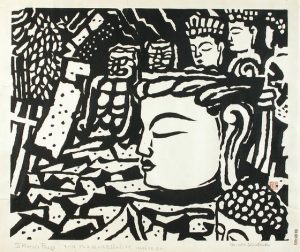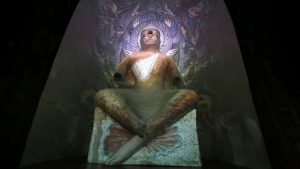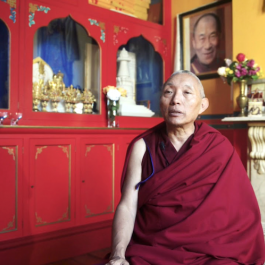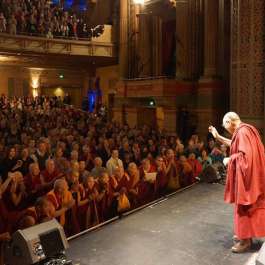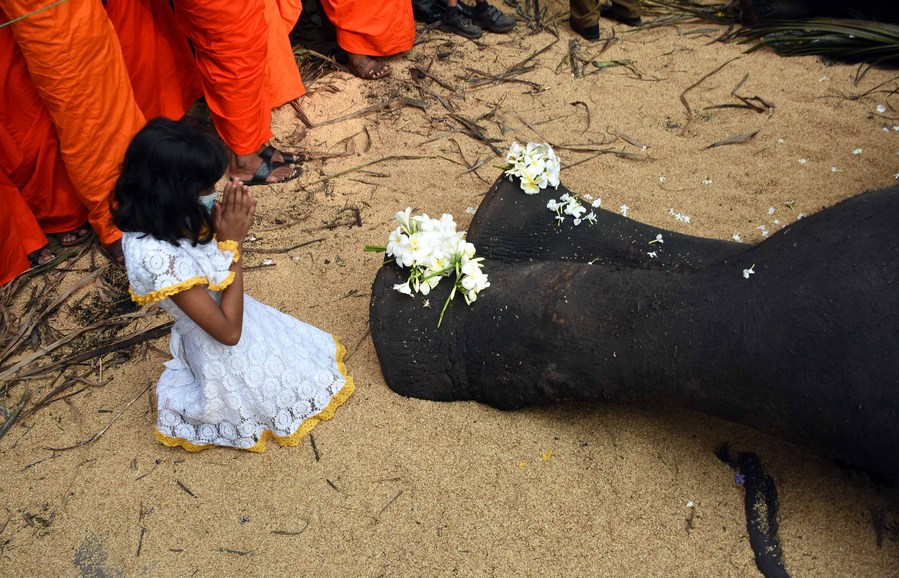
Buddhists in Sri Lanka are mourning the passing of the island nation’s most sacred elephant, Nadungamuwa Raja, who died at the age of 69 on Monday morning. Nadungamuwa Raja, one of the most celebrated pachyderms in Asia, had been the ceremonial bearer of the sacred tooth relic of the Buddha during religious festivals and events every year since 2005.
On Monday, a procession of mourners, including monks and members of the public, paid their respects to Nadungamuwa Raja during Buddhist funeral rites, prostrating before his body in reverence. Mahout Wilson Kodithuwakku, who had cared for Nadungamuwa Raja for some 25 years, said he felt deeply saddened by the elephant’s passing, noting that he had escorted the sacred bearer on foot in every procession.
Born in the Indian city of Mysore in 1953, Nadungamuwa Raja was the tallest tamed tusker in Asia, standing 3.2 meters high. He was the most senior of 100 official ceremonial elephants, tasked with carrying a golden casket of Buddhist relics on his back in public processions and festivals, decked out in an elaborate costume decorated with colorful lights and regularly accompanied by armed guards. Nadungamuwa Raja would anually walk some 90 kilometers over seven days from Colombo to the Temple of the Sacred Tooth Relic in the central city of Kandy, stopping at Buddhist shrines along the way.
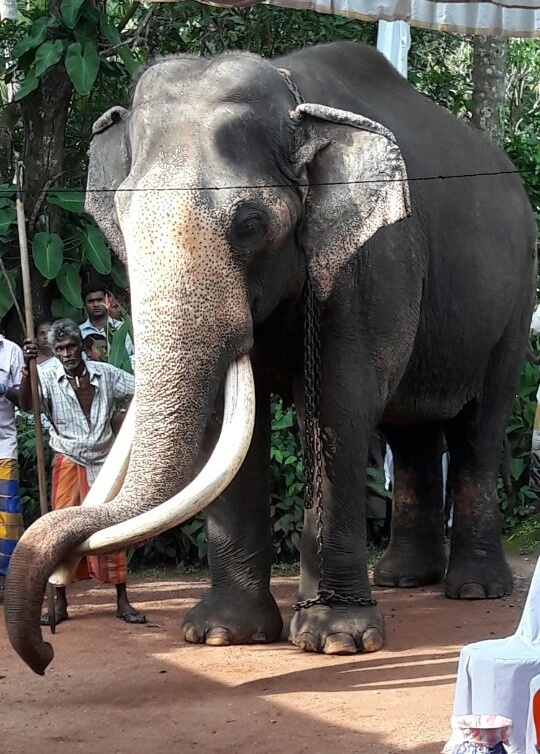
In an official statement, Sri Lanka’s president, Gotabaya Rajapaksa, decreed Nadungamuwa Raja to be a “national treasure” and that his remains should be preserved by taxidermists “for future generations to witness.” (Al Jazeera)
“I was deeply saddened to hear of the Raja, who had been carrying the Tooth Relics on his shoulders since 2005 with great pride,” Rajapaksa tweeted on 7 March. “May the elephant, who has been revered by the people of the country and abroad for many years, be able to attain the great Nirvana and be inspired by the noble merit of carrying the relics of honor at the Temple of the Tooth.” (UCA News)
Among the mourners who traveled to attend funeral rites for Nadungamuwa Raja on Monday evening, Sunethra Adikari, 65, said that people loved the elephant and regularly offered food when he walked in public. “We always loved the elephant that carried the sacred Tooth Relics and many people today are saddened by the loss of the animal,” she said. “When the media reported that the tusker walked on the streets, hundreds of people including children ran to the road to pay respect.” (UCA News)
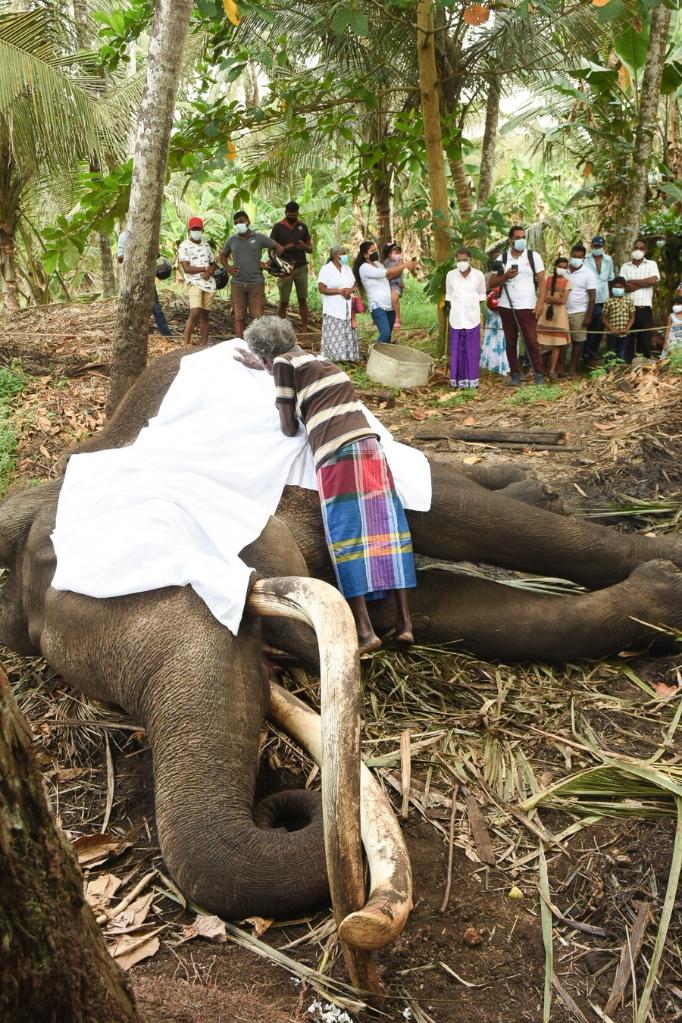
Photo by Gayan Sameera. From news.cn
Nadungamuwa Raja originally belonged to the Indian maharaja Jayachamarajendra Wadiyar, who gifted him to a Sri Lankan monastic physician for treating an illness, according to the Dharmavijaya family who had been caring for Raja from 1978. The monk could not afford to care for the elephant and sold him on to a timber mill near Colombo. The Dharmavijaya family, his final owners, later purchased Nadungamuwa Raja, saying they were reluctant to see such a striking elephant perform manual labor.
Elephant ownership has long been a symbol of prestige and status among Sri Lanka’s wealthy, and a traditional feature of religious ceremonies in this predominantly Buddhist country. Although it is illegal to own elephants without a government permit, at least 40 elephants have been abducted from the island’s national parks in the last decade, according to the Sri Lankan authorities. While a 2011 census report showed an increase in Sri Lanka’s elephant population, wildlife conservationists remain concerned that deforestation due to urbanization, the use of wild animals as gifts for VIPs, and ownership of elephants as a status symbol could harm the island’s population of wild elephants.
Since 2015, the Sri Lankan government has been clamping down on the illegal ownership of elephants—many of which are poached from the wild. In November 2016, Agence France-Presse reported that under the new regulations, violators could lose their ownership licenses and face a jail term of up to three years. In 2017, Sri Lanka’s government introduced tougher legislation aimed at protecting elephants from exploitation, including banning the use of captive elephants under the age of five and ensuring healthy diets for elephants in captivity.
Buddhism is the state religion of Sri Lanka, with 70.2 per cent of the population of some 20 million people identifying as Theravada Buddhists, according to census data for 2012. Hindus made up 12.6 per cent of Sri Lankans, while Muslims accounted for 9.7 per cent, Christians 7.4 per cent, and others 0.05 per cent. As the state religion, Buddhism receives special privileges under the constitution, although the constitution also stipulates freedom of religion and right to equality for all citizens.
See more
Sri Lankan Buddhists mourn passing of revered elephant (UCA News)
Tusker Royalty Nadungamuwa Raja Dies at 68 (LNW)
69-year-old tusker ‘Nadungamuwa Raja’ dies (Daily News)
Sri Lanka mourns death of 69-year-old Indian tusker declared ‘national treasure’ (The Hindu)
‘National treasure’: Sri Lanka’s most revered elephant dies at 68 (Al Jazeera)
Asia Album: Sri Lankans bid farewell to ceremonial tusker Nadungamuwa Raja (Xinhuanet)
Related news reports from BDG
Buddhist Monks in Sri Lanka Pray for the Victims of Military Coup in Myanmar as Death Toll Rises
Eminent Sri Lankan Monk Ven. Kotugoda Dhammawasa, Dies Aged 88
Senior Sri Lankan Monk Ven. Napane Premasiri Thero Dies, Aged 98
India Pledges US$15 million Grant to Boost Buddhist Ties with Sri Lanka
Buddha Statue Returned to Sri Lanka by British Family after 100 Years
Tragic End for Tikiri, the Emaciated 70-year-old Elephant in Sri Lanka







